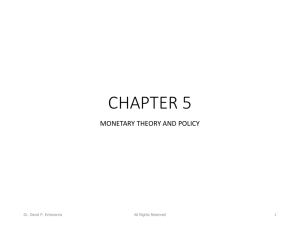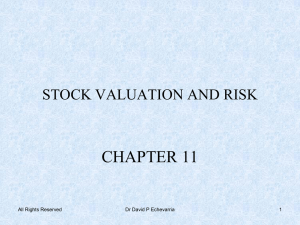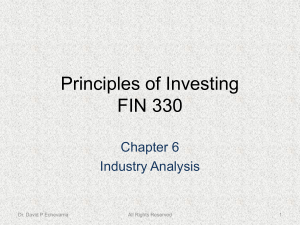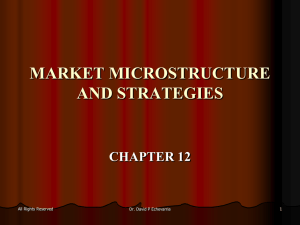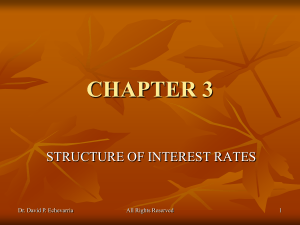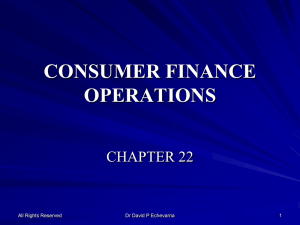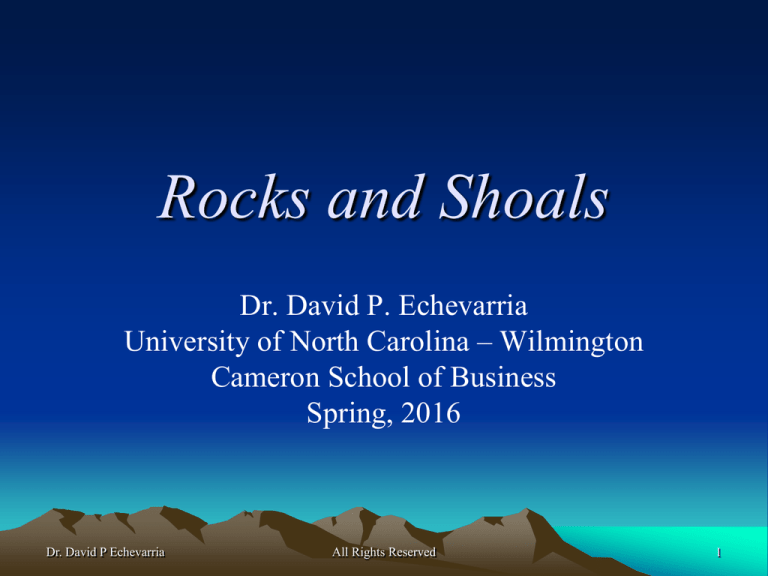
Rocks and Shoals
Dr. David P. Echevarria
University of North Carolina – Wilmington
Cameron School of Business
Spring, 2016
Dr. David P Echevarria
All Rights Reserved
1
Tips on getting through the FMI course
A. Skim read the assignments before class
1. Reading the material the night before the exam
will invariably lead to a poor grade.
B. Keep up with the homework as assigned.
1. helps to understand material
2. helps with exams questions.
3. Homework due on exam day.
All Rights Reserved
Intro & Chapter 1
Page 2
Tips on getting through the FMI course
C. Attendance
1. Missing classes results in poor exam performance.
2. I regularly take attendance.
3. Penalty for excessive absences.
D. Class Participation
1. Don’t hesitate to ask questions!
All Rights Reserved
Intro & Chapter 1
Page 3
General Information
A. Course Syllabi and Lecture Notes
1. My UNCW web page:
http://www.csb.uncw.edu/people/echevarriad/
a. Course Related Information
b. Course notes require Adobe Reader
c. Hyperlinks to business related web sites
B. Email
1. I use email to communicate important
information to students. Make certain your email
account is able to receive mail.
All Rights Reserved
Intro & Chapter 1
Page 4
A Thought on Exams
A. Things Happen!
1. Take the responsible approach – keep up with the
work (reading and homework)
2. Email me before the exam – we’ll work
something out.
3. Failure to do so means you take Version 2 (the
nightmare version).
All Rights Reserved
Intro & Chapter 1
Page 5
Any Questions?
Then lets get started
Dr. David P Echevarria
All Rights Reserved
6
CHAPTER 1
ROLE OF FINANCIAL MARKETS &
INSTITUTIONS
ECN – 324 -002
Dr. David P Echevarria
All Rights Reserved
7
What’s this course about?
A. The US is a fully developed market economy
1.
2.
3.
4.
An efficient banking system.
An active and liquid securities market.
A well defined insurance network.
A highly developed system for consumer and
business financing
5. An increasing demand for financial specialists to
analyze, manage, and advise.
FINANCIAL MARKET FUNCTIONS
A. Efficient Allocation of Resources
1. Provide funds to most efficient investments
2. Provide Capital Surplus to Capital Deficit units
B. Risk Management & Risk Reduction
1. Provide hedging instruments
2. Diversify investments to reduce risk
C. Efficient Transfer of Financial Claims
1. Provide low cost liquidity services
2. Facilitate efficient movement of capital
Dr. David P Echevarria
All Rights Reserved
9
SECURITIES TRADED IN FINANCIAL
MARKETS
A. Money Market Instruments
1. Maximum 1 year maturities
2. T-Bills, Commercial Paper, Bankers Acceptances
B. Capital Market Instruments
1. Long maturity debt securities (Bonds)
2. Stocks
C. Derivative Securities
1. Options
2. Futures
Dr. David P Echevarria
All Rights Reserved
10
TYPES OF FINANCIAL
INTERMEDIARES
A. Depository Institutions
1. Banks, Credit Unions, Savings & Loan
Associations
B. Contractual Savings Institutions
1. Insurance Companies, Pension Funds
C. Investment Intermediaries
1. Mutual Fund Companies, Finance Companies
Dr. David P Echevarria
All Rights Reserved
11
REGULATORY STRUCTURE
A. Regulatory Divisions by the US Congress
1. Security Markets
2. Depository Institutions
B. Objectives of Regulation
1. Protect consumers/investors
2. Insure a level playing field
C. Rational for Regulation
1. Increase information flow
2. Insure financial soundness
Dr. David P Echevarria
All Rights Reserved
12
INTERNATIONAL INTEGRATION OF
FINANCIAL MARKETS
A. Financial Services / Infrastructure
1. Follows international trade patterns and practices
2. Stage of host market development key to service
level
B. Foreign Investment
1.
2.
3.
4.
Dependent upon availability of information
Restrictions on direct investment
Affected by the political climate
Ability to repatriate profits
Dr. David P Echevarria
All Rights Reserved
13
HOMEWORK QUESTIONS
A. What is the difference between Surplus and Deficit
units?
B. How do Primary markets differ from Secondary
markets?
C. What is the difference between Money and Capital
markets?
D. What is Marketability and why is it important?
E. How Depository and Non-Depository institutions
differ in services provided?
Dr. David P Echevarria
All Rights Reserved
14
HOMEWORK
F. While you are surfing the web, add the following
sites to your tool bar:
1.
2.
3.
4.
5.
www.marketwatch.com
http://time.com/
http://www.usnews.com/
http://www.economist.com/
http://www.wsj.com/
G. The last URL is for the Wall Street Journal. You
cannot read everything but you get a short precis of
what’s going on.
Dr. David P Echevarria
All Rights Reserved
15

